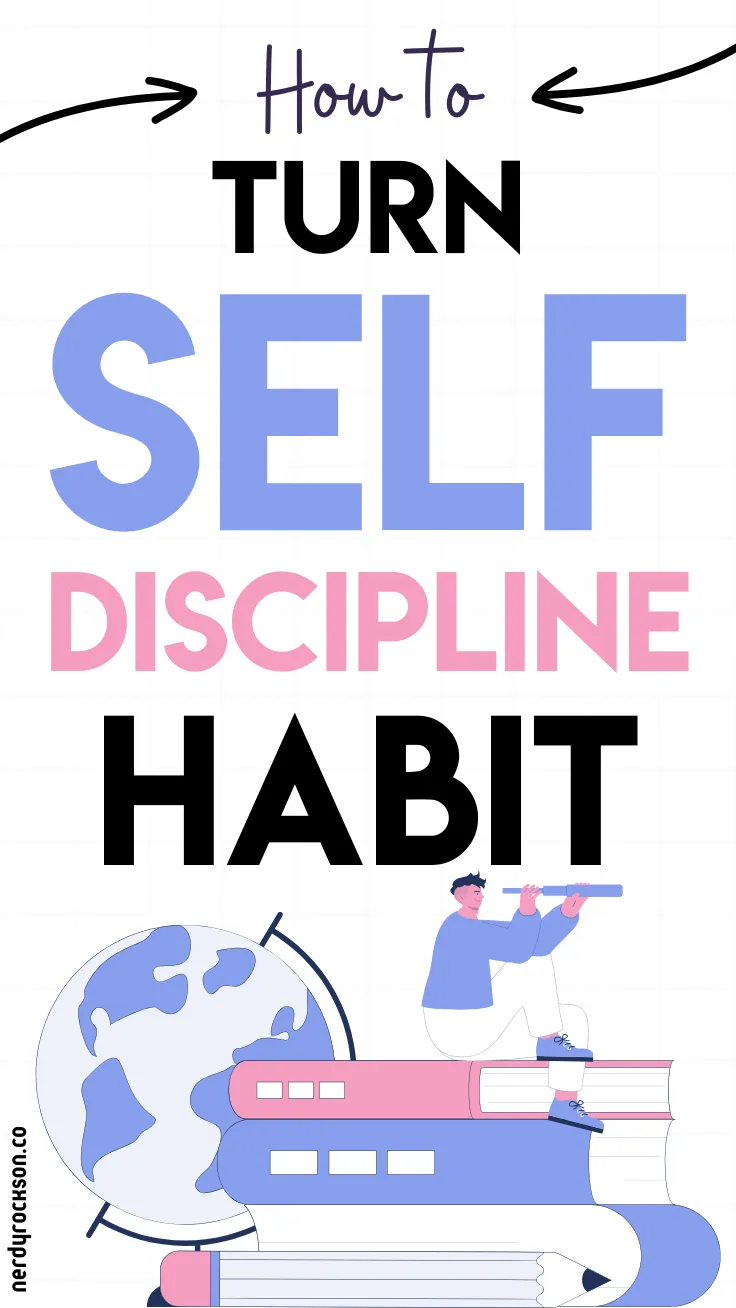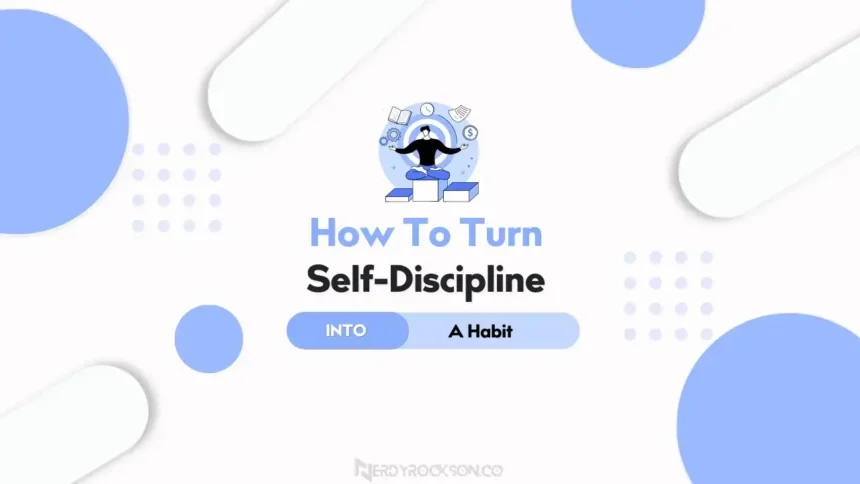Self-discipline is often cited as a cornerstone of success, playing a vital role in both personal and professional spheres. It is the ability to control one’s impulses, emotions, and desires in pursuit of long-term goals. This essential quality helps individuals make better decisions, remain focused, and overcome challenges, ultimately leading to a more fulfilling and prosperous life.
However, the path to developing self-discipline as a habit is not without its difficulties, and it requires persistence, patience, and a solid commitment to change. But fear not, for this blog post is here to guide you through turning self-discipline into a daily practice. In the following sections, we will delve into understanding the concept of self-discipline, identifying your motivation, setting realistic goals, establishing a consistent routine, utilizing accountability tools, embracing failure, and celebrating your successes.
By the end of this post, you’ll have a comprehensive roadmap for cultivating self-discipline, empowering you to pursue your dreams and lead a more balanced and accomplished life. So, let’s embark on this journey together and discover the transformative power of self-discipline.
Understanding Self-Discipline
Before we dive into the strategies for developing self-discipline, it’s essential to understand what it entails clearly. In essence, self-discipline is the ability to regulate one’s behavior, emotions, and actions to achieve long-term objectives. It involves the practice of delaying instant gratification in favor of working diligently towards more meaningful and lasting accomplishments. Simply put, self-discipline is the art of aligning your actions with your values and goals, even in the face of challenges, distractions, or temptations.
Self-Discipline in Personal and Professional Life
Self-discipline is a valuable trait that has far-reaching implications for personal and professional success. In our personal lives, self-discipline helps us maintain healthy habits, such as regular exercise, proper nutrition, and sufficient sleep, which contribute to our overall well-being. It enables us to manage our finances responsibly, build and maintain strong relationships, and pursue our passions.
In the professional realm, self-discipline drives productivity, time management, and goal achievement. It allows us to stay focused on tasks, meet deadlines, and make informed decisions, all essential for career advancement. In essence, self-discipline gives us the mental grit and determination to excel in every aspect of our lives.
Common Misconceptions about Self-Discipline
- Self-discipline is an innate trait: Many people mistakenly believe that self-discipline is an inherent quality that some individuals possess and others do not. However, the truth is that self-discipline is a skill that can be learned and developed over time through consistent practice and effort.
- Self-discipline is about punishment and deprivation: Another misconception is that self-discipline requires denying oneself any form of pleasure or enjoyment. While it does involve making sacrifices, self-discipline is not about leading a joyless existence; it’s about making informed choices that prioritize long-term fulfillment over short-term gratification.
- Self-discipline means never deviating from a rigid routine: Some may assume that self-discipline necessitates adhering to a strict schedule without any deviation. In reality, self-discipline is about being adaptable and finding balance. Life is unpredictable, and it’s crucial to maintain the flexibility to adjust our plans and routines accordingly.
Now that we’ve clarified the concept of self-discipline, let’s explore the practical steps you can take to integrate this powerful skill into your daily life.


1. Identifying Your Motivation
One of the most critical aspects of developing self-discipline is identifying a compelling purpose that drives you to persevere through challenges and maintain focus on your long-term goals. A clear purpose serves as a foundation for your actions, giving you direction and motivation when times get tough. When you have a strong reason for cultivating self-discipline, you’re more likely to stay committed to the process, even when faced with obstacles or setbacks.
Tips for finding your motivation
- Reflect on your values: Take some time to think about your core values and beliefs. What is truly important to you? Understanding your values can help you identify goals that align with those principles, providing a meaningful source of motivation.
- Visualize your ideal future: Consider what you want your life to look like in the long term. What achievements would make you feel fulfilled and proud? Use this vision to guide your goal-setting and help you stay motivated.
- Identify specific goals: Break down your larger aspirations into smaller, more concrete goals. Having specific objectives can make it easier to stay focused and motivated, as you’ll have a clear roadmap for success.
- Surround yourself with inspiration: Seek out books, podcasts, or even individuals who inspire you and share your values. Learning from their experiences and insights can help fuel your motivation and reinforce your commitment to self-discipline.
Once you have a clear understanding of your motivation, you can use it as a powerful tool to reinforce your self-discipline. Keep your purpose at the forefront of your mind, regularly reminding yourself of the reasons behind your actions. When faced with challenges or temptations, recall your motivation and use it to bolster your resolve.
Additionally, consider sharing your goals and motivations with a close friend or family member who can provide support and encouragement throughout your journey. This external reinforcement can further strengthen your commitment to self-discipline and help you stay on track.
With a strong sense of motivation in place, you’ll be better equipped to develop self-discipline as a habit and ultimately achieve your long-term goals.
2. Setting Realistic Goals
Setting realistic and achievable goals is a crucial component of developing self-discipline. By establishing goals within your reach, you increase your chances of success and maintain motivation over time. Unrealistic goals, on the other hand, can lead to frustration, self-doubt, and, ultimately, the abandonment of your self-discipline journey. By setting goals that are both challenging and attainable, you strike a balance that promotes growth and progress.
Creating SMART goals
An effective way to ensure that your goals are realistic and well-defined is to use the SMART criteria:
- Specific: Clearly define what you want to achieve, avoiding vague or ambiguous statements.
- Measurable: Establish a way to track your progress and determine when you’ve reached your goal.
- Achievable: Ensure that your goal is within your capabilities and resources while still presenting a challenge.
- Relevant: Align your goals with your values, interests, and long-term aspirations.
- Time-bound: Set a deadline for achieving your goal, providing a sense of urgency and motivation.
By following the SMART framework, you create a solid foundation for your self-discipline journey, enabling you to stay focused and committed to your objectives.
Breaking down larger goals
When faced with a daunting, long-term goal, it’s easy to feel overwhelmed and unsure where to begin. To make your goals more approachable, break them down into smaller, more manageable tasks. This process not only makes your goals less intimidating but allows you to see your progress more clearly, providing a sense of accomplishment and motivation.
For example, if your goal is to run a marathon, you might break it down into smaller tasks like increasing your weekly running distance, incorporating strength training, and improving your diet. By tackling each of these smaller tasks, you’ll gradually work towards your larger goal in a structured and achievable manner.
As you progress through your self-discipline journey, remember to review and adjust your goals as needed regularly. This flexibility will ensure that your objectives remain relevant and motivating, helping you stay committed to developing self-discipline as a habit.
3. Developing A Consistent Routine
A consistent daily routine is an invaluable tool in cultivating self-discipline. By creating structure and predictability in your life, a routine helps you manage your time effectively, reduces procrastination, and ensures that you allocate sufficient time to work towards your goals. Furthermore, a routine promotes healthy habits, improving mental and physical well-being, and helps you build momentum, making it easier to maintain self-discipline over time.
Tips for establishing an effective routine
- Prioritize your tasks: Identify the most critical tasks that contribute to your long-term goals and ensure that they are included in your daily routine.
- Balance work and leisure: While it’s essential to allocate time for goal-oriented tasks, also incorporate leisure activities and relaxation into your routine to avoid burnout and maintain overall well-being.
- Establish morning and evening routines: Develop consistent morning and evening rituals to help you start and end your day on a positive note. This consistency can help you maintain focus and motivation throughout the day.
- Be mindful of your energy levels: Schedule demanding tasks during periods when you have the most energy, and reserve less taxing activities for times when your energy is lower.
- Allocate time for reflection and self-assessment: Set aside regular intervals to review your progress, assess your routine’s effectiveness, and make any necessary adjustments.
Adjusting your routine
It’s crucial to remember that your routine should not be rigid or inflexible. Life is ever-changing, and your routine should be adaptable to accommodate fluctuations in your circumstances, goals, and priorities. Periodically review your routine, making adjustments as needed to ensure that it remains aligned with your objectives and continues to support your self-discipline journey.
By developing and maintaining a consistent routine, you create an environment conducive to self-discipline, empowering you to stay focused on your goals and turn self-discipline into a lasting habit.
4. Utilising Accountability Tools
Accountability is a powerful force in cultivating self-discipline. When we hold ourselves accountable for our actions and decisions, we’re more likely to stay committed to our goals and maintain self-discipline. Additionally, external accountability – involving others in our journey – can provide motivation, support, and encouragement, further reinforcing our self-discipline efforts.
Finding an accountability partner
An accountability partner or group is an individual or a collective of people who share similar goals and are committed to supporting one another in their self-disciplined journey. This partnership can offer valuable encouragement, advice, and motivation while fostering a sense of responsibility towards the group.
To find an accountability partner or group, consider the following:
- Reach out to friends or family members who share similar goals or values and express your interest in forming an accountability partnership.
- Explore online forums, social media groups, or local clubs related to your goals, where you may find like-minded individuals interested in forming an accountability group.
- Attend workshops, seminars, or conferences related to your goals, as these events often attract individuals with similar interests and aspirations.
Using technology to track and monitor progress
In today’s digital age, various tools and apps can help you track your progress and maintain accountability. These technological solutions can serve as powerful reminders of your goals and provide valuable insights into your progress, habits, and areas for improvement. Some popular options include:
- Habit trackers: Apps such as Habitica, Streaks, or HabitBull can help you monitor your daily habits and maintain consistency in your self-discipline journey.
- Goal-setting and progress-tracking apps: Tools like Trello, Asana, or Todoist enable you to set specific goals, break them down into smaller tasks, and monitor your progress over time.
- Time management and productivity apps: Apps like RescueTime, Focus@Will, or Forest can help you manage your time effectively, stay focused, and avoid distractions.
By leveraging the power of accountability tools, you can enhance your self-discipline efforts and maintain motivation on your path toward turning self-discipline into a habit.
5. Embracing Failure And Learning From It
As you work towards developing self-discipline as a habit, it’s crucial to acknowledge that setbacks and failures are an inevitable part of the process. No one is perfect, and everyone experiences moments of weakness or lapses in self-discipline. Rather than dwelling on these setbacks or allowing them to derail your progress, it’s essential to view them as opportunities for growth and learning.
How to handle failure and learn from it
- Accept and acknowledge the setback: When you experience a failure or setback, permit yourself to feel disappointed or frustrated, but also recognize that these emotions are temporary and don’t define your worth or ability.
- Reflect on the situation: Analyse the factors that contributed to the setback and identify any patterns or triggers that may have led to the lapse in self-discipline. This self-awareness can help you anticipate future challenges and devise strategies to prevent similar setbacks.
- Learn and adapt: Use your newfound insights to make necessary adjustments to your goals, routine, or strategies. This process of learning and adapting is a crucial aspect of developing self-discipline as a habit.
- Forgive yourself and move forward: Remember that everyone experiences setbacks, and it’s essential to forgive yourself and maintain a positive mindset. Focus on your progress and achievements thus far, and use the setback as motivation to recommit to your self-discipline journey.
Build Resilience and Perseverance
Resilience and perseverance 1 are vital qualities in overcoming setbacks and continuing your journey toward self-discipline. To cultivate these traits:
- Develop a growth mindset: Embrace the idea that your abilities can be improved through dedication and hard work. This mindset encourages you to view setbacks as opportunities for growth rather than insurmountable obstacles.
- Surround yourself with support: Foster a network of supportive friends, family, or accountability partners who can offer encouragement and understanding during challenging times.
- Focus on progress, not perfection: Recognise that perfection is an unrealistic expectation, and instead, concentrate on the progress you’ve made and the lessons you’ve learned.
- Practice self-compassion: Treat yourself with kindness and understanding when setbacks occur, acknowledging your efforts and reminding yourself of your accomplishments.
By embracing failure and learning from setbacks, you can build resilience and perseverance, ultimately strengthening your self-discipline and turning it into a habit that will serve you well in all areas of life.
6. Celebrating Success And Rewarding Yourself
As you progress on your journey towards developing self-discipline as a habit, it’s essential to celebrate your successes and reward yourself for your accomplishments. Acknowledging your achievements reinforces your positive behavior, boosts your motivation, and maintains momentum in your self-discipline journey. Moreover, it helps you develop a sense of pride and self-worth, reinforcing the idea that you can achieve your goals.
Ideas for appropriate rewards
When rewarding yourself for your successes, it’s important to choose rewards that align with your long-term goals and values. Consider the following ideas for appropriate rewards and celebrations:
- Treat yourself to a unique experience: Enjoy a day trip, a spa day, or a special meal at your favorite restaurant to celebrate your success.
- Invest in personal growth: Purchase a book, sign up for a course, or attend a workshop related to your interests or goals to reward your hard work.
- Engage in a favorite hobby or leisure activity: Set aside time to indulge in an activity you love, such as painting, reading, or hiking, to acknowledge your progress.
- Share your success with others: Celebrate your achievements with friends or family members who have supported and encouraged you.
- Practice self-care: Reward yourself with a relaxing activity, such as a massage, a yoga class, or a long bath, to rejuvenate your mind and body.
Balancing rewards with continued self-discipline
While it’s important to celebrate your achievements, it’s also crucial to maintain a balance between rewards and continued self-discipline. Keep the following tips in mind:
- Ensure that your rewards are proportional to your achievements: Avoid indulging in excessive or overly frequent rewards that could undermine your self-discipline efforts.
- Time your rewards appropriately: Schedule your rewards after you’ve reached a specific milestone or accomplished a particular goal rather than using them as a distraction from your responsibilities.
- Use rewards as motivation: Leverage the anticipation of a reward to help you maintain focus and motivation during challenging moments or when faced with distractions.
By celebrating your successes and rewarding yourself in a balanced and thoughtful manner, you can reinforce your self-discipline efforts and sustain the motivation needed to turn self-discipline into a lasting habit.
Conclusion
Throughout this blog post, we’ve discussed various strategies to help you turn self-discipline into a habit:
- Understanding the importance and role of self-discipline in personal and professional life.
- Identifying your motivation and using it to fuel your self-discipline efforts.
- Setting realistic goals by creating SMART objectives and breaking them down into smaller tasks.
- Developing a consistent routine to create structure and maintain focus.
- Utilizing accountability tools, such as partnering with others or using technology, to stay on track
- Embracing failure as an opportunity for growth and learning.
- Celebrating your successes and rewarding yourself in a balanced and thoughtful manner.
Developing self-discipline as a habit requires time, patience, and persistence. Start by implementing the strategies outlined in this blog post, and be prepared to adjust your approach as you progress. Remember that setbacks and challenges are part of the journey, but with perseverance and commitment, you can overcome them and grow stronger in the process.
Turning self-discipline into a habit offers numerous long-term benefits. As you become more disciplined, you’ll find it easier to achieve your goals, manage your time effectively, and maintain a healthy work-life balance. Moreover, self-discipline fosters resilience, confidence, and personal growth, empowering you to thrive in all areas of life.
By cultivating self-discipline as a habit, you can unlock your full potential and create a fulfilling, purpose-driven life that aligns with your values and aspirations.










Nice content